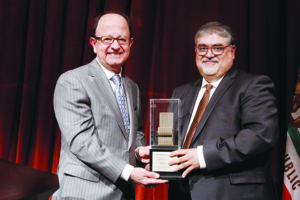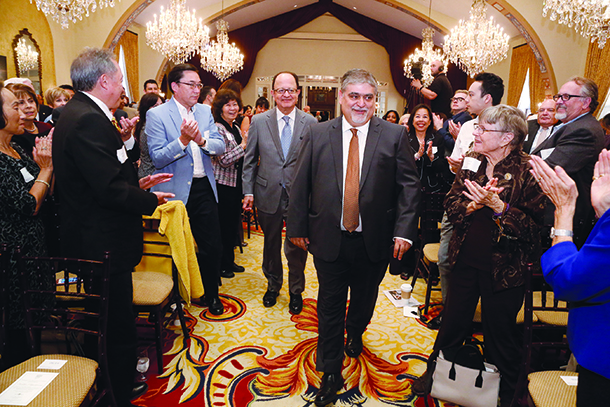Vassilios Papadopoulos — researcher, scientist, innovator and leader — was installed as dean of the USC School of Pharmacy and recipient of the John Stauffer Dean’s Chair in Pharmaceutical Sciences at USC on Nov. 1, marking a new milestone in the school’s 111-year history.

USC President C. L. Max Nikias, left, presents Vassilios Papadopoulos, USC School of Pharmacy dean, with the John Stauffer Dean’s Chair in Pharmaceutical Sciences at USC, during Papadopoulos’ installation ceremony Nov. 1 at the University Park Campus. (Photo/Steve Cohn)
Welcoming guests to a ceremony at Town & Gown on the University Park Campus, President C. L. Max Nikias, PhD, described the beginnings of pharmacy in Greek legend, when Asclepius, the Greek god of medicine, delegated the job of creating healing remedies to his daughter Hygieia.
Nikias also noted the USC School of Pharmacy’s long “history of firsts” since its establishment in 1905, which include being the first in the nation to offer a four-year degree in pharmacy, the first to offer a doctorate in pharmacy and the first to offer a clinical pharmacy program.
At a time when USC is redefining the role of the pharmacist as a healer, Papadopoulos, DPharm, PhD, understands that improving the human condition is at the heart of the school’s mission, Nikias said.
He described Papadopoulos’ extensive portfolio of professional experiences and accomplishments, which includes publishing his first scholarly paper at age 22, becoming a full professor before he was 40 and, in one four-year span, holding faculty appointments in three departments at Georgetown University in cell biology, pharmacology and neuroscience, as well as heading up the university’s Division of Hormone Research. At the Research Institute at McGill University Health Center in Montreal, Papadopoulos rose even further to a new leadership role, overseeing 500 researchers and 1,200 students, focusing on unifying the university’s departments. His research work has had major implications for aging, cancer reproduction and brain disorders such as Alzheimer’s.
Papadopoulos’ leadership, unmatched expertise across fields and clear track record of bringing people together make him the ideal leader for the School at a time when the growing convergence of biology, genomics, chemistry and medicine demands close ties between research and clinical care, Nikias added.
“By considering the past, we can see the future,” Nikias said. “It is a future in which intense collaboration — not separation — of the sciences will give us breakthroughs to overpower our most complex diseases.”
Nikias introduced Papadopoulos to the audience, which included Provost Michael Quick, PhD, First Lady Niki Nikias, Papadopoulos’ wife, Martine Culty, PhD, University Trustee Leonard D. Schaeffer, senior university administrators, deans, School of Pharmacy councilors, faculty and staff. Following Nikias’ introduction, Papadopoulos thanked those in attendance and commended Nikias and Quick for their extraordinary leadership in growing USC’s reputation for excellence.
Calling USC a “global leader,” Papadopoulos explained why he chose to come to Los Angeles after living in Athens, Paris, Sydney, Washington, D.C., and Montreal.
“USC has a way of expanding your thinking and opening possibilities,” he said. “It’s a bold and exciting place, accomplishing major advances at an impressive speed.”
He outlined multiple initiatives to accelerate USC School of Pharmacy’s upward trajectory.
- Focusing on attracting increasing numbers of top students from across the country and around the world, as well as those representing a diverse range of backgrounds.
- Expanding collaborative education initiatives across USC’s health sciences disciplines — as well as other academic units, such as USC Dornsife’s life sciences programs, the USC Marshall School of Business, the USC Price School of Public Policy, the USC Gould School of Law, and numerous others.
- Expanding job placement opportunities for graduates by enhancing the school’s integration with the biotechnology and pharmaceutical industries and by promoting a wider range of options in such areas as government and regulatory affairs, environmental organizations, and beyond.
- Continuing to build a pipeline to pharmacy education for undergraduate and high school students.
- Fully harnessing the capacity of big data not only to improve the quality of care for patients, but also to fuel the discovery of new drugs for a host of conditions.
- Continuing to expand the school’s work in the safety net, helping people not only in Southern California but around the world.
Papadopoulos spoke of the ever-changing, rapidly evolving nature of information and technology and its impact on the biosciences, and described a desire to ensure the USC School of Pharmacy faculty can continue to innovate.
“When a faculty member comes to me with a radical idea — a novel approach that could be transformative for science and for the university — I want to be able to provide the support to pursue that notion,” he said. “Like our students, I want our faculty to dream big.”
“So please come to me with those daring ideas,” he continued. “From fundamental investigations to translational research, and from clinical innovations to health outcomes and policy efforts, what we do is dream together.”
— Michele Keller


